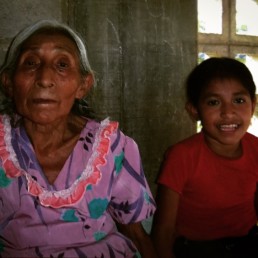This essay was originally published in the Journal of the American Medical Association, November 2009.
Maria is going home today.
Her name was halfway down the daily patient schedule, and I met it with the usual mixed reaction of anticipation and dread. Over the ten years we had known one another as physician and patient, we both had changed in ways that allowed her appointment time to feel less like a wrestling match and more like a slow, mutual reality check. She was now nearing 70, her hypertension, diabetes, and cholesterol were probably as good as they were going to get, and her medications were finally set in a regimen that she understood and I was therefore reluctant to change. Treating her depression and anxiety, however, had been one of my greatest challenges as a young physician fresh out of residency. The limited medical and psychological resources for this uninsured, immigrant woman and the life story underlying her symptoms only magnified my baseline sense of inadequacy.

“The ache for home lives in all of us. The safe place where we can go as we are and not be questioned.”
- Maya Angelou
Perhaps I felt so unsteady because I had so many women like Maria in my rapidly expanding practice. The clinic was new, though not the building. Part of the county health system, we operated out of the converted storefront office of a former realty company, whose name was still chiseled in stone above the front door. We were sandwiched between a popular Mexican restaurant and the corner panaderia, and the word spread rapidly that we would treat everyone regardless of background, medical history, or ability to pay. For me, the job fit well with my personal philosophy and professional vision, both of which were taken to task multiple times each day as I struggled to mend the health and spirit of each patient like Maria.
Maria, like many of my patients, had grown up and lived most of her life on a ranch in Mexico. She immigrated to the United States because her husband was coming here, and for her that meant she did not have a choice. In the stories that emerged over the years, I heard terrible tales of violence endured during the early decades of her marriage. After she left Mexico the physical abuse stopped, but her husband still controlled where she went and what she did. The two places she was allowed to go without much interference were to church and to the clinic. She visited both frequently.
“Perhaps home is not a place but simply an irrevocable condition.”
- James Baldwin

At each visit she greeted me warmly with a motherly kiss and a flash of her gold-capped smile before launching into a list of mental and physical aches and pains. She was even more religious than the other women I saw, usually wearing a substantial array of rosaries, scapulars, and sacred medals. I frequently received a final and public benediction as I led her to the front desk to make her next appointment, bowing my head as she asked the “Most Holy Virgin and all the saints” to rain down blessings upon my family and me. Then she would pass me a foil-wrapped stack of warm gorditas, which she encouraged me to eat “with a little bit of coffee.” There were countless days when the gorditas saved some other unsuspecting afternoon patient from having to deal with a hypoglycemic, unfocused doctor because she had forgotten, or didn’t have time for, lunch.
As time went on, our conversations focused on issues of self-worth and self-esteem as much as anything else. My own confidence had begun to improve in these discussions with my patients, and those themes were supported and deepened with the help of a new clinical counselor. I began to see changes in Maria. She walked straighter. She spoke with conviction. She took leadership roles in her church, which required extra meetings that her husband opposed. For the first time, well into her 60s, she simply told him, “I am going.” And she went.
Her physical symptoms began to improve, and we spent infinitely less time chasing the source of multiple complaints. For years her blood pressure and cholesterol level were not as well controlled as I would have liked, perhaps because both of us knew that something deeper was broken inside. Still, I fretted over the numbers and tried to make changes that wouldn’t overwhelm her. As she started to believe in herself, she also began to believe that her body was worth taking care of. She started taking her medicines just like she did everything else—religiously. And one miraculous day, I shared her latest laboratory results with her—all exactly where they needed to be—and told her I was proud of her.

“One never reaches home," she said. "But where paths that have an affinity for each other intersect, the whole world looks like home, for a time.”
- Hermann Hesse
Although Maria continued to enjoy her new relative freedom and better health, she still fervently missed her life back in Mexico. She talked about the color of the desert flowers, the smell of food cooking in the ranch kitchen, the feel of the wide, open air, and the quiet brilliance of the stars. More than anything she longed to see her mother, now in her 90s, and the community of women that she had left behind. I sometimes marveled at her desire to return to a place where she had also endured so much pain. But we all carry memories of home that are seared into the private corners of our hearts, give them their own importance, and then decide where we truly belong.
Maria decided to go home. I was caught by surprise when she told me. I’m used to patients traveling back and forth to Mexico, sometimes for months at a time. So when I hugged and congratulated her, I asked, “For how long?” She shrugged and smiled. “Forever.” We shared another hug and I asked when she was leaving. “Right now,” she replied. “I’m on my way to the airport.” Incredulous that the clinic was literally her last stop, I made sure she had enough medication for at least the next several weeks and said a heartfelt good-bye. Her eyes glistened as she whispered, “Tonight I will be with my friends, saying the rosary on the front porch of my ranch under a million stars. I will say a prayer for you, Doctora.” Then she pressed a package of gorditas into my hand, blessed each of the staff, and was gone.
“Home is a notion that only nations of the homeless fully appreciate and only the uprooted comprehend.”
- Wallace Stegner

I’ve often thought of Maria since she returned home and imagine her quietly praying beneath the stars. I hope she still believes that she is worth taking care of. I see her again in other patients’ stories—the ones whose health does not seem to improve despite my best efforts. I remember her in unchecked boxes and thwarted algorithms—the diabetic foot examination still left undone, the medication change that has to wait for one more visit. Occasionally my patients allow me a textbook ending, improving because they took the pills I prescribed or followed some piece of advice that I offered. More often, the textbook is filled with hidden subtexts and notes scribbled in the margins—difficult to comprehend or an outright mystery. I still read it page by page, and on a good day I discover healing and meaning among the worn pages. My work has led me in new directions where I not only support and promote standards and quality initiatives, but I sometimes even suggest and develop them. Still, I find myself wishing for one more box I could check, one that reads “Something Else . . . Maybe More Important.” So often in the “Something Else,” the healing occurs between the lines, and time and relationship bear witness to a patient who finds her voice, or her way home.